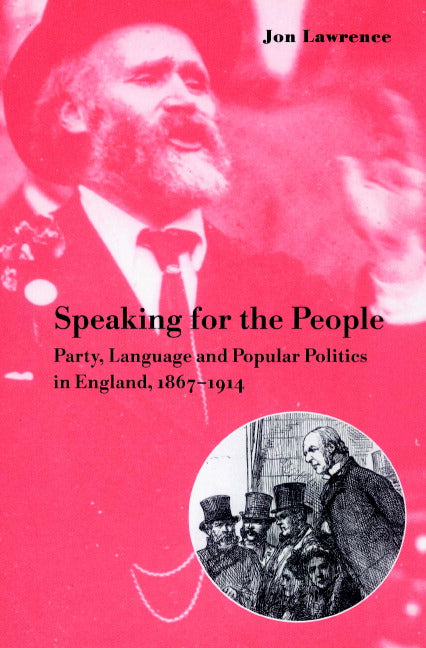Freshly Printed - allow 8 days lead
Couldn't load pickup availability
Speaking for the People
Party, Language and Popular Politics in England, 1867–1914
A 1998 study of British political culture and the popular appeal of Liberal, Tory, and Labour politics, from 1867 to 1914.
Jon Lawrence (Author)
9780521893664, Cambridge University Press
Paperback, published 9 May 2002
304 pages, 7 tables
22.9 x 15.2 x 1.7 cm, 0.612 kg
'This is a rich and challenging book, which repays careful reading by a wide audience interested in the role of locales - how they are made and remade - in the constitution of British social, political and cultural life … I strongly recommend it.' Economic and Political Areas
Speaking for the People, first published in 1998, draws our attention to the problematic nature of politicians' claims to represent others, and in doing so it challenges conventional ideas about both the rise of class politics, and the triumph of party between 1867 and 1914. The book emphasises the strongly gendered nature of party politics before the First World War, and suggests that historians have greatly underestimated the continuing importance of the 'politics of place'. Most importantly, however, Speaking for the People argues that we must break away from teleological notions such as the 'modernisation' of politics, the taming of the 'popular', or the rise of class. Only then will we understand the shifting currents of popular politics. Speaking for the People represents a major challenge to the ways in which historians and political scientists have studied the interaction between party politics and popular political cultures.
Preface
Abbreviations
Introduction
Part I. Rethinking Popular Politics: 1. From the rise of 'demos' to the rise of 'class'
2. Working-class homogeneity reconsidered
3. Relocating popular politics
Part II. A Local Study: Wolverhampton, c.1860–1914: 4. Liberal hegemony and its critics
5. Popular Toryism and the origins of Labour politics
6. Labour and the working class, 1890–1914
Part III. Party Games, 1885–1914: 7. Popular politics and the limitations of party
8. The fall and the rise of popular Liberalism, 1886–1906
9. Labour roots, Labour voices, Labour myths
Conclusion
Bibliography.
Subject Areas: Modern history to 20th century: c 1700 to c 1900 [HBLL], British & Irish history [HBJD1]


